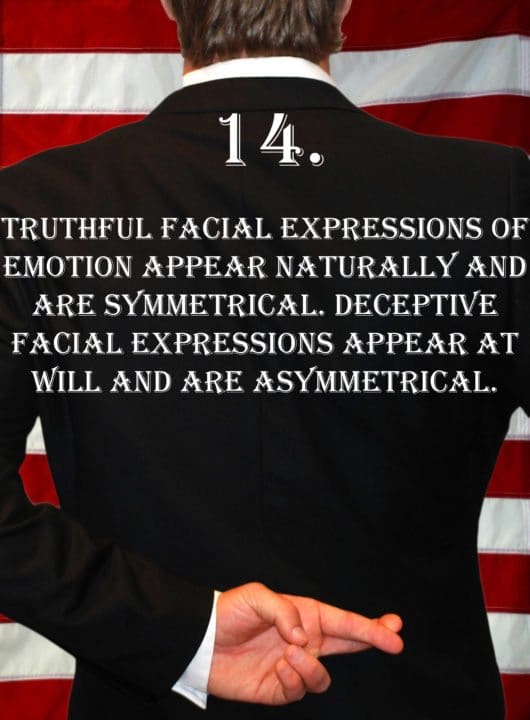
Deception Tip 38:
When a liar is under pressure or duress, the muscles of the neck may tense up and the veins may protrude.
Listen To The Podcast!
E38 – Tense Neck – Deception Tips Podcast – Click Here To Subscribe
Podcast Transcript
Hello and welcome to the deception tips podcast where you will learn amazing cues to detect deceit that will help you read people like never before, I’m your host Spencer Coffman, let’s get started.
Welcome to episode 38 of the deception tips podcast. Last time we talked about how people try to mask the face more than the body and this is because they believe that the face is what people watch more than the body, which is true. People watch the face a lot more than the body, so that is why the conscious tries to hide different signs of leakage and deception on the face.
As a result, it allows the unconscious to leak nonverbal signs of deception on the body rather than the face. You can use this to your advantage by paying attention to not only the face but also the body to see if you can pick up on any of these signs of deception.
Remember that the body has a larger surface area than the face, therefore, due to common sense reasoning, there will be more signs of deception on the body than on the face.
However, remember the face has a lot of tinier muscles and as a result can have a lot more, little micro-expressions than the body. Therefore, obviously, you need to pay attention to both the face and the body but pay attention to the body a lot more.
This means that when you are speaking with someone do your best to put yourself in a position where you have the opportunity to watch their entire body, not only their face. That means do not sit them behind the table or a desk, stand or sit across from them in chairs, something where you can see and watch their entire body.
Today, we are going to talk about another sign of deception that is moving down from the face and up from the body, it’s still a part of the body but it is the neck. Usually, when people lie, there is always a lot of tension and stress. People are stressed to the max when they lie unless they are really used to lying and are really good at lying, they are definitely stressed.
We talked about this a lot back in episode 13 where we said staying silent is a great way to use that stress and tension to your advantage because when a liar is stressed, silence really pushes them over the edge.
Usually, even when you’re not stressed and you have a conversation, there’s that awkward silence or that pause where no one says anything. Everybody around feels tension and stress and it’s why it’s called an awkward silence.
So, usually, someone says something to fill the gap, usually, it’s just stupid things like ‘awkward’ or ‘whatever’ because they’re filling that silence. So, when someone is lying and there’s that pause, that stress and tension of telling a lie goes from bad to worse. Because now you’re adding the stress and tension of telling a lie plus, you’re adding the awkwardness of silence.
You’re putting those two things together and that person who is telling a lie is going to start sweating bullets, so they will speak to fill a void. Oftentimes, they’ll slip up and you can catch them in their lie. So, remember that when people are lying, they are stressed, they are tensed. A lot of this stress and tension can be seen on someone’s neck.
The neck has a lot of strong veins and muscles in it and oftentimes when people are angry, we always say all your neck muscles are protruding or your neck is tensing up. I can see the veins popping in your neck.
It is a huge sign of anger and of stress and of tension. So, when people lie and they’re under stress and tension, if you watch their neck and you see those veins and muscles pop and move, this is often a great sign of knowing when someone is stressed and tensed.
One thing to consider is that when people are stressed out you need to know if they’re stressed because of their lie or because of something else. So, this is why it’s important to pay attention to the context of the conversation and also the things around them, and the baseline behaviors of that person. Are they normally stressed, are they normally tense, etc.?
So, before we get into all that here is deception tip number 38. When a liar is under pressure or duress the muscles of the neck may tense up and the veins may protrude. Here it is again deception tip number 38. When a liar is under pressure or duress the muscles of the neck may tense up and the veins may protrude.
So, as I’ve said before, this is something that you need to pay attention to, it’s very important. You need to watch their baseline behavior and also what else is going on around them and why they may be stressed or tense. This is important, so baseline behavior, is the behavior that they are in all the time, it is their normal resting behavior.
So, if you know this person, you know that they’re usually a little bit hypertension or high strung. Then, if their neck veins and muscles are popping all the time, you know that they’re not lying, so get a baseline behavior.
If that means you need to steer the conversation away from whatever it is you want to find out and you need to spend some time talking about the weather or their daughter-in-law or what their kid is doing or their dog or anything like that.
If you need to steer the conversation away from whatever you’re trying to find out to get a little bit of a feel for how they converse, then do it. Those 15 minutes or half-hour or 10 minutes that it takes for you to get on that tangent and come back to the topic at hand are going to be well worth your time. This is because you need to understand how that person normally communicates and how they normally express themselves without trying to be defensive or telling a lie.
If you can establish that baseline behavior, then you can bring it back to the topic at hand and see if there is a change in that normal baseline behavior. If there’s a change, then that means something is going on, it means that something is not normal because the normal pattern of behavior has changed.
Then the other thing you need to pay attention to in the context of the situation. If there are a lot of external factors, if there’s anything going on that is going to put more stress, more tension on them then obviously that could be some of the cause of their neck muscles protruding. We’re going to talk a lot more about the context of the situation and environmental factors coming up right after this.
Would you like to know if you are being lied to? Lies are everywhere and they could be happening to you. A guide to deception is a great book filled with information on how to spot lies. Get your copy today online at spencercoffman.com.
Once again, I want to thank you for listening to the deception tips podcast where you are going to learn how to read people and detect deception so you can never be lied to again. My name is Spencer Coffman and today we are talking about how liars may have a tense neck when they are telling a lie. Stress and tension will always go up when people are being deceptive, it doesn’t matter, it will go up.
Now, the question is, how well can they hide that increased tension and stress. Some people who are good at lying or who lie all the time can hide it a lot better than others. But most people, most normal people will not be able to hide it very well and then that’s why you’ll see these nervous behaviors or nervous tics or signs of deception or leakage that come out.
We talked about one a while back on how they bounce both legs, that was episode number 30. So, check that out if you haven’t yet and even if you have, I encourage you to go back and listen to it again because it is through repeated exposure to something that you become better and better and then you will gain more knowledge of the topic.
So, even though you may have listened to them before, feel free to listen to them again, get your friends to listen to them then talk about them. Because through talking about it and teaching other people you will really learn a heck of a lot more than if you simply listen to this on your way to work. Therefore, pay attention to people’s necks because they are a great area of that tension and stress coming out of the body.
They often have their veins protruding, the muscles will get tight and you will see it visibly in the front of the neck. Also, on the sides, like right above where that collar bone gets thin, above the shoulders, right above the trapezius muscle, and a little bit towards the center, kind of outside of that Adam’s apple region. You will start to see little veins popping and tensing your neck and things like that.
This can happen for a variety of reasons, it could happen because they are lying in that stress and tension is coming out. Therefore, you need to pay attention to the context of the situation. Also, if you know, what makes people uncomfortable, then you can look around and see if there’s something in that environment that’s making them uncomfortable as well.
Like if they’re certain sounds or noises or if you’re talking there are fireworks or if there’s road construction, people may be tense or on edge because of that instead of because of what they’re saying.
So, you need to not only establish that baseline behavior but also take into account the environmental factors of the situation and how they may be affecting that person and their chi, if you will. Or their balance or their essential being on how they are feeling at that time because of that is stressing them out it may not be that they’re lying.
In addition, you need to also be aware that the tense muscles in their neck could also be due to something like excitement or anger. It may not be because they’re stressed or tense about lying, it could be because whatever you’re talking about is really making them upset.
Or, they could be super excited about whatever they’re talking about and that excitement is just showing up in their neck and they’re really enthused and they’re showing it through their tense neck muscles.
There could also be reddening of the face, anger and excitement can go hand in hand. When people are excited, they tend to speak louder, faster, as you saw in my little example.
You didn’t see my example, you heard my example there. When I was super excited about what I was about to tell you and I’m speaking a little bit faster you can hear it in my voice. You can’t see it, but you can see it in your mind’s eye per se.
It’s just like when we spoke about how, when blocking unlikable stimuli, it’s not only something that they might see when they cover their eye, it also could be something that they hear. So, when I say you can see the excitement in my voice, it’s not that you can see it, but you can see it in your mind’s eye, you can hear that excitement in my voice.
You can almost visualize me with my arms moving up, my fists maybe clenched like a ‘yes’ type of deal. They are usually above my shoulders, you can see that tense neck, and you can visualize that whole picture of excitement. In the same way, if someone is angry and they’re screaming at someone in there saying whatever, you can see that in your mind’s eye.
Instead of both hands up, it’s probably one hand up, it’s probably in a clenched fist, jaws tense, their eyes are stirring, looking straight ahead. The neck muscles are getting tense as well.
The point I’m making here is that with anger and excitement, you can visualize and hear a stark difference in their demeanor and body language and voice, etc. Therefore, if you see those tense neck muscles, you’re going to know if it’s anger or excitement or if it’s something else.
So, you can easily throw out anger and excitement if they have tents neck muscles and neither of those other clusters, hello, or patterns of behavior is not present. Such as the arms in the air, the clenched fist, the excitement in the voice, or the anger in the voice, things like that. That’s a cluster or pattern of behavior.
So, if you’re seeing tense neck muscles without the rest of that cluster then that means something else is going on. usually, it means they’re stressed or tense about something. If you can eliminate the environmental factors and if you have established a baseline behavior, and you know that they’re not normally stressed or tense.
They don’t have some kind of weird twitching going on or some kind of stroke or neural damage from the past that causes them to clench their jaw all time and tense up their neck, gulp, or whatever. You know that that stress or tension if it’s not coming from anger, it’s not coming from an environmental factor, it’s not coming from excitement, then it is coming from a lie.
That means you need to steer that conversation back to that topic where you saw those tense neck muscles. You need to see if you can establish any other clusters or patterns of behavior and elicit them to come out of them so that you can notice them and see what they are lying about.
Then you can kind of poke and prod on that topic and see other things. Then you can eventually when you are certain, you can say, “Hey, what’s going on here? I’m pretty sure you’re not telling the truth”. But obviously, if they get that vibe from you that you are telling them, “Hey, I’m not believing what you’re saying”, then that’s going to make them a little bit more nervous as well.
Also, they’re not going to know that you don’t know exactly what they’re lying about, you just know they’re lying. So, if you say I know you’re not telling the truth here and I know it’s about XYZ, they’re going to be like, holy moly, is this person reading my mind? Then you can push them, and they may start to tell you the truth. They don’t know that you don’t know the exact truth, you just know they’re lying.
So, you can use that to your advantage and say, “Hey, I tell you this because now you know that there’s no point in lying to me anymore because I’m going to find out, boom, tell me what you know”. They will oftentimes spill the beans especially once you’ve tuned in to that little station on their dial.
You can watch their body language and deviations from baseline and the second they start to throw in something off, you can say, “ah, let’s get back to reality here, I can tell you’re getting off on me again”. They will just continue to be amazed and they will continue to tell you the truth. Because you have already proven that you will know when they’re lying.
Once again, I want to thank you for listening to the deception tips podcast. I hope that you’ll share it with your friends, subscribe to the feed, check out the deception tips videos, and the deception tips blog, and take a look at the books I have available as always tune in next week for a new deception tip.
Video Transcript
Hey guys, my name is Spencer Coffman, thank you for watching the deception tips videos. They’re all about teaching you how to read people and detect deception so that you will be able to tell if someone is lying to you. Today, we are going to talk about a precursor to a few different emotions, but it is also something that happens when lying.
When people lie, they are under a tremendous amount of tension, stress, anxiety, etc. All these negative emotions that really cause people to boil and so it’s like a tea kettle with that little thing in it and the steam is just waiting to come out and whistle, they’re waiting to blow. It’s a balloon that’s too full of hot air and it’s going to burst at any second.
Now, that sounds a lot like anger too, so this tension is kind of a precursor to, like I said, another emotion, which is anger. This tension can be displayed on the body in a number of different ways. We’ve talked about it many times before with pacifying gestures, with cover up gestures, with soothing gestures. Today, we’re going to look for an anger sign that is also a precursor to lying.
So, here it is, deception tip number 38. When a liar is under pressure or duress, the muscles of the neck may tense up and the veins may protrude. Now, that is like when you see those cartoons where the person is like ahhh and their neck is just going to bulge. Sometimes, a lot of bodybuilders, they already have those big veins in their neck just because they’re either on a bunch of steroids and they’re really bulked up or because they just have so many muscles up there that those veins are popping out.
Also, you could see it if people eat too much salt then their veins show. If they have veins that are close to the skin, then they eat a lot of salt now their veins are protruding. So, just like any of these other signs, there could be many reasons why this could happen but usually when people get really tense and frustrated and angry, their veins, their muscles in the necks, everything just tenses up. You can really see that in their neck, you can see it in their posture, you can see it in how they are going.
Another thing is, if you tell people to stand up really straight, they often lock their neck and their shoulders are set and they’re just like a board, stiff as a board, they’re rigid, you can see it in their posture. So, when you’re watching for that, when you’re talking with people and you see that, wow, this person is like ramrod straight, their neck muscles are coming out, things are not really normal. They don’t seem like they’re flowing, or they don’t seem chill, they seem like they’re tense and you can pick up on that.
This could be due to the fact that they are telling a lie because when people lie, as we’ve said before, they are under a ton of tension, pressure, stress, etc. The reason they’re under that is because normal people do not like to lie, normal people are not comfortable with telling lies. That’s only people who are abnormal or they could be a sociopath or psychopath type of individuals, pathological liars, they love telling lies and it makes them feel good, so then, of course, they don’t get tense.
They get tense when they don’t tell lies but other people, they usually get tense when they’re telling a lie because they know their conscience tells them that it’s not the right thing to do. So, that creates conflict and that creates anxiety, creates stress, tension, some of which could be exhibited through veins or tense neck muscles. It depends on the person, some people could exhibit it in the wringing of their hands, biting their lips as we’ve talked about before, otherwise the tense neck muscles.
So, when you’re watching for that, you need to be very careful because tense neck muscles could either mean they’re lying, or it could mean they’re angry. So, if they’re angry and you accuse them of lying, now they’ve gone from angry to really angry. You’re going to really make them upset, especially if they’re not lying, you’re accusing them of lying when they’re just upset about something.
They’re going to become really upset, so you’ve got to be very careful with that especially with accusing them because if you start seeing those tense neck muscles, there is a very good chance that they could be angry. Do you really want to like poke the bear or pour gasoline on the fire type of a thing? You don’t, so that is why if you see that, let it be like a red flag for you to look for other behaviors.
Chances are if they’re angry you’re going to see that they’re angry because as soon as you see their neck muscles going, anger happens so quickly that they’re going to do something else. They’re either going to yell, they’re going to kick the floor, whatever the case may be, it’ll happen next. Whereas, if they’re lying, you may have to sit back a little bit watch for a few other signs to happen then you’ll be able to tell, so watch for the patterns and the clusters of behavior.
If this is your first time watching these videos, I’d love to have you subscribe to the channel on YouTube, we’ve got tons of information there, feel free to leave any comments on there as well. Also, if you’d like more information, we have lots of information, we’ve got podcasts, books, blog posts, all available on spencercoffman.com that is dedicated teaching you exactly what everybody is really saying.
Until next time.






